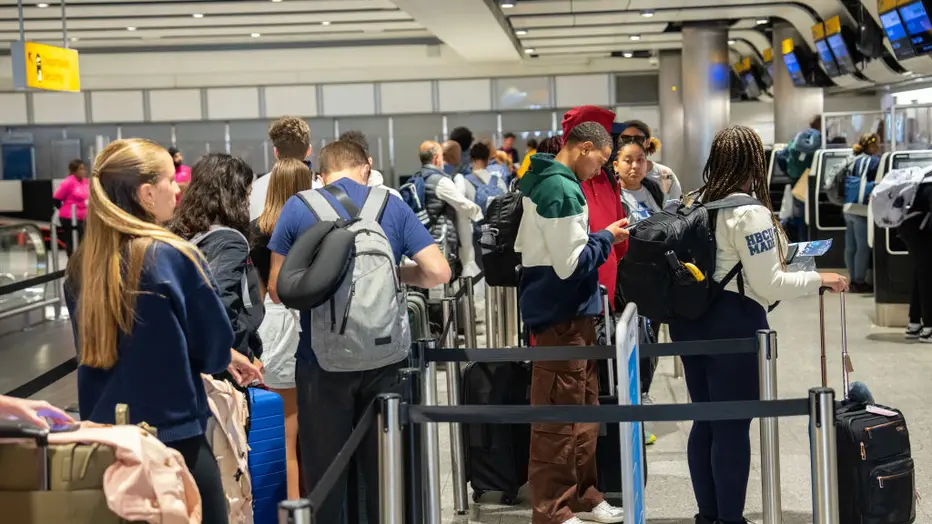Travel trends are changing quickly in 2025. According to a recent survey by MMGY Travel Intelligence, just 33% of U.S. travelers plan to visit Europe this summer. This is a sharp decline from 2024, when nearly 45% of American international travelers said they would take a European trip.
This sudden dip is not just about changing preferences. Experts say two main factors are keeping Americans away from Europe this year: the rising cost of international travel and growing political tensions in certain parts of the continent.
Travel Costs Keep Rising: Americans Take a Step Back
One of the biggest reasons Americans are avoiding Europe this year is the high cost of travel. With inflation still affecting airline tickets, hotel stays, food, and transportation, planning a vacation to Europe has become more expensive than ever.
Flights to popular destinations like Paris, Rome, and Barcelona are 15–20% more expensive this summer compared to last year. In many cases, round-trip tickets now cost more than $1,500, making it harder for middle-class families and solo travelers to afford an overseas adventure.

In addition to airfare, hotel prices across Europe have seen steady increases. According to a report from Hopper, European hotel rates have gone up by 10–12% in 2025 due to high demand and a shortage of hospitality staff in tourist cities. Currency fluctuations have also made expenses unpredictable, especially in countries like the UK.
Political Uncertainty Adds to Traveler Hesitations
Cost isn’t the only concern for American travelers. Political unease across parts of Europe is also making people think twice.
Recent protests in France over labor reforms, security alerts in Germany due to upcoming elections, and continuing tensions between Russia and neighboring countries have made safety a bigger factor for U.S. tourists. Travelers are increasingly paying attention to global news and security advisories from the U.S. State Department before booking trips.
According to Travel Pulse, nearly 40% of Americans surveyed said “geopolitical risks” were a reason they are not planning a European trip this year. Some are worried about being caught in civil unrest or flight disruptions due to strikes or instability.
Younger Travelers Still Interested but More Cautious
While older travelers are more likely to cancel or delay their European plans, younger tourists—especially Gen Z and Millennials—still show interest in visiting Europe, though with caution.
Rather than completely skipping international travel, many are choosing shorter trips or more affordable destinations in Eastern Europe, where the cost of living is lower than in Western countries.
Some younger Americans are also opting for “budget backpacking” or using platforms like Workaway to volunteer in exchange for accommodation, cutting costs while still enjoying the experience of international travel.
Domestic Travel Is the New Trend for Summer 2025
With fewer Americans planning to go overseas, domestic tourism is seeing a noticeable boost. National parks, coastal cities, and small-town getaways are expected to be the biggest winners this summer.

Destinations like Yellowstone, the Florida Keys, and Charleston, South Carolina, are seeing a rise in bookings. Travel websites such as Expedia report a 22% increase in domestic hotel and vacation rental bookings compared to last year.
Not only is domestic travel more affordable, but it also comes with fewer risks—no passport delays, fewer currency issues, and a lower chance of getting caught in political unrest.
Airlines and Tour Companies Adjust Their Strategies
The decline in U.S. tourists heading to Europe is already affecting the travel industry. Airlines are adjusting flight schedules, cutting down on less popular routes, and increasing flights to local U.S. destinations.
Tour operators and travel agencies that specialize in European packages are now pivoting to offer more domestic and nearby international options like Canada, Mexico, and the Caribbean.
Some are introducing flexible booking policies and offering discounts to attract hesitant travelers. Others are launching “safe destination” tags on their websites to highlight regions with low risk and stable political climates.
Will Travel to Europe Rebound Next Year?
Experts believe that this drop in European travel might be temporary. If inflation slows down and the political situation stabilizes, many expect numbers to bounce back in 2026.
Still, the current trend shows that Americans are becoming more selective and cautious when planning their vacations. Flexibility, safety, and affordability are now more important than ever.
For now, the idea of sipping espresso in Rome or walking the streets of Paris may remain on the bucket list for many—until the time is right.
Also Read – Mead Law Group Unveils New Mediation Arm in Nevada






